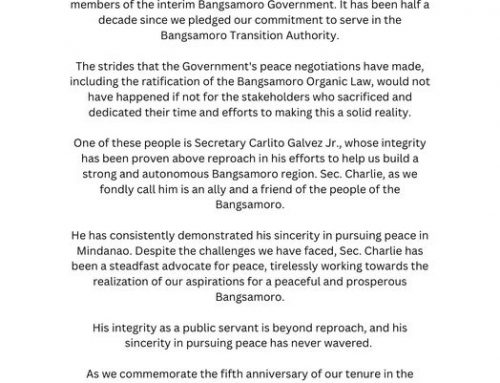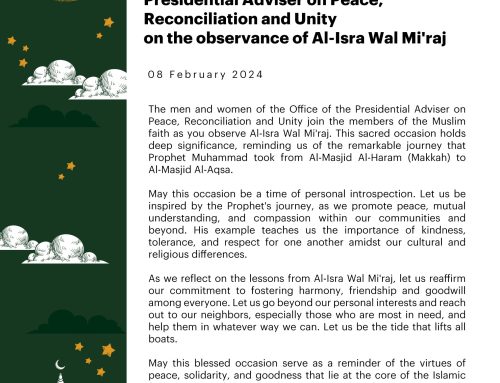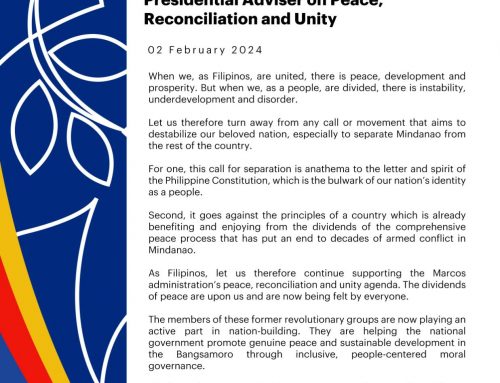The Office of the Presidential Adviser on the Peace Process or OPAPP is the office mandated to oversee, coordinate, and integrate the implementation of the comprehensive peace process. The agency was created through Executive Order No. 125, s. 1993 which was later amended in 2001 with the signing of Executive Order No. 3, s. 2001 as a reaffirmation of the government’s commitment to achieving just and lasting peace through a comprehensive peace process.
Vision
A just and lasting peace for the nation and for all Filipinos.
Mission
To oversee, coordinate, and integrate the implementation of the comprehensive peace process.
Mandate
As stated in section 5b of Executive Order 3, s.2001, the Presidential Adviser on the Peace Process (PAPP), shall be charged with the management of the comprehensive peace process and has the authority to coordinate and integrate, in behalf of the President, all existing peace efforts. Further, in Section 9 of the same EO, the Office of the Presidential Adviser on the Peace Process (OPAPP) shall provide technical and administrative support to the Presidential Adviser on the Peace Process (PAPP) in the discharge of functions for the coordination and implementation of all components of the comprehensive peace process which include pursuit of social, economic and political reforms; consensus-building and empowerment for peace; peaceful, negotiated political settlement with different armed groups; programs for reconciliation, reintegration into mainstream society and rehabilitation; addressing concerns arising from continuing armed hostilities, and building and nurturing a climate conducive to peace.
Function
As articulated in EO 3, s. 2001, the Presidential Adviser on the Peace Process (PAPP) shall be charged with the management of the comprehensive peace process and has the authority to coordinate and integrate, in behalf of the President, all existing peace efforts. The said Executive Order further outlines the following functions and responsibilities of the PAPP:
1. Advise and assist the President in the management, direction and supervision of the comprehensive peace process
2. Recommend to the President policies, programs and actions to implement the comprehensive peace process
3. Report to the President on the progress of implementation of the comprehensive peace process
4. Supervise the government agencies and instrumentalities to include their programs and activities, purposely created for the implementation of various components of the comprehensive peace process, such as the Government Peace Negotiating Panels, etc.
5. Coordinate with other government agencies involved in the implementation of the comprehensive peace process, as well as the various departments and instrumentalities which should participate or provide support to the overall effort
6. Conduct regular dialogues with peace partners to seek relevant information, comments and recommendations as well as to render appropriate and timely reports on the progress of the comprehensive peace process
7. Perform such other functions as directed by the President
Expanded Function
On 18 July 2016, President Rodrigo Roa Duterte directed that the EO No. 3, s.2001 of OPAPP be amended to enable it to oversee all development projects and at the same time empower it to implement projects that are related to peace. The implementation of massive development on the ground will be done simultaneously with the work to implement agreements that government had entered into.
As outlined in Executive Order No. 3, s. 2001, the mandate of OPAPP to carry out the comprehensive peace process is guided by the Three Principles of the Comprehensive Peace Process and the Six Paths to Peace.
Three Principles of the Comprehensive Peace Process
The comprehensive peace process is governed by the following underlying principles:
1) It should be community-based, reflecting the sentiments, values, and principles important to all Filipinos. Thus, it shall be defined not by the government alone, nor by the different contending groups only, but by all Filipinos as one community.
2) It aims to forge a new social compact for a just, equitable, humane, and pluralistic society. It seeks to establish a genuinely pluralistic society, where all individuals and groups are free to engage in peaceful competition for predominance of their political programs without fear, through the exercise of rights and liberties guaranteed by the Constitution, and where they may compete for political power through an electoral system that is free, fair, and honest.
3) It seeks a principled and peaceful resolution to the internal armed conflicts, with neither blame nor surrender, but with dignity for all concerned.
Six Paths to Peace
The comprehensive peace process is comprised of six (6) vital components known as the Six Paths to Peace. The following components are pursued in a simultaneous and integrated fashion:
1) PURSUIT OF SOCIAL, ECONOMIC AND POLITICAL REFORMS. It involves the vigorous implementation of various policies, reforms, programs, and projects aimed at addressing the root causes of internal armed conflicts and social unrest. This may require administrative action, new legislation, or even
constitutional amendments.
2) CONSENSUS-BUILDING AND EMPOWERMENT FOR PEACE. It includes continuing consultations on both national and local levels to build consensus for a peace agenda and process, and the mobilization and facilitation of people’s participation in the peace process.
3) PEACEFUL, NEGOTIATED SETTLEMENT WITH THE DIFFERENT REBEL GROUPS. It involves the conduct of face-to-face negotiations to reach peaceful settlement with the different rebel groups. It also involves the effective implementation of peace agreements.
4) PROGRAMS FOR RECONCILIATION, REINTEGRATION INTO MAINSTREAM SOCIETY AND REHABILITATION. It includes programs to address the legal status and security of former rebels, as well as community-based assistance programs, to address the economic, social, and psychological rehabilitation
needs of former rebels, demobilized combatants, and civilian victims of the internal armed conflicts.
5) ADDRESSING CONCERNS ARISING FROM CONTINUING ARMED HOSTILITIES. It involves the strict implementation of laws and policy guidelines, and the institution of programs to ensure the protection of non-combatants and reduce the impact of the armed conflict on communities found in conflict areas.
6) BUILDING AND NURTURING A CLIMATE CONDUCIVE TO PEACE. It includes peace advocacy and peace education programs, and
the implementation of various confidence-building measures.
Core Values
To take on the mandate that created and strengthened the functions of OPAPP, the agency recognized a set of core values. These core values will enable its executives and personnel not just to understand peace but also to be part of the process by being agents and pro-active seekers of peace.
Patience: through unrelenting pursuit of the comprehensive peace process towards a just and lasting peace for all Filipinos.
Equity: through equal distribution of peace dividends for conflict-affected communities, and through competitive compensation and recognition of OPAPP employees.
Active Non-Violence: through pursuit of a comprehensive peace process that does not replicate and exacerbate the armed struggle.
Compassion and Kindness: through formation of an environment conducive to peace that truly cares for others.
Excellence: through diligence in work and unwavering commitment to deliver the best results each day.
Faith and Hope: through trust in the comprehensive peace process and in the different people that have made the progresses in peace possible.
Understanding: through unbiased and unprejudiced conduct of the peace process that recognized, welcomes, and appreciates religious and cultural roots of people.
Love: through compassionate and unselfish valuation for conflict-affected communities and for colleagues.
Honesty and Integrity: through commitment to the highest ethical standards required of government employees as civil servants.
Equality: through fair and unbiased appreciation and recognition of different classes, genders, cultures, and religions.
Acknowledgement: through acceptance of different people and their different ways-of-life as possible contributors to the peace process.
Respect: through recognition of each and everybody’s esteem and their personal worth without prejudice.
Truth and Justice: through fair adherence to the laws of the land, in its words and its spirit.











